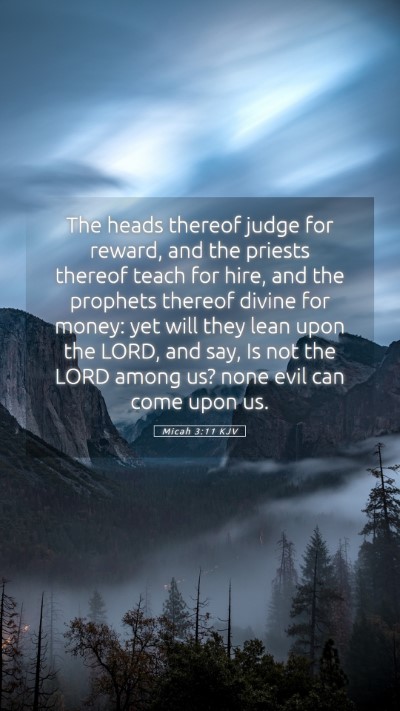Old Testament
Genesis Exodus Leviticus Numbers Deuteronomy Joshua Judges Ruth 1 Samuel 2 Samuel 1 Kings 2 Kings 1 Chronicles 2 Chronicles Ezra Nehemiah Esther Job Psalms Proverbs Ecclesiastes Song of Solomon Isaiah Jeremiah Lamentations Ezekiel Daniel Hosea Joel Amos Obadiah Jonah Micah Nahum Habakkuk Zephaniah Haggai Zechariah MalachiMicah 3:11 Meaning
What is the meaning of Micah 3:11?
The heads thereof judge for reward, and the priests thereof teach for hire, and the prophets thereof divine for money: yet will they lean upon the LORD, and say, Is not the LORD among us? none evil can come upon us.
Micah 3:11 Bible Verse Meaning
Meaning and Interpretation of Micah 3:11
Micah 3:11 states: “The heads thereof judge for reward, and the priests thereof teach for hire, and the prophets thereof divine for money: yet will they lean upon the Lord, and say, Is not the Lord among us? none evil can come upon us.” This verse presents a scathing commentary on the corrupt religious and political leaders of ancient Israel.
Bible Verse Understanding
This verse illustrates a troubling reality: leaders who are supposed to serve the people are instead motivated by greed and self-interest. The Bible verse meanings found in the commentaries highlight the profound ethical and spiritual failures of these leaders, who exploit their positions for personal gain. The corruption is particularly highlighted against the hypocrisy of the people who still call upon the Lord despite their iniquity.
Bible Verse Explanations
- Political Corruption:
According to Matthew Henry, the rulers “judge for reward,” which implies a willingness to compromise justice for monetary gain. This denotes a serious abandonment of their responsibilities and roles as leaders.
- Religious Corruption:
Albert Barnes notes that the priests and prophets are guilty of preaching for profit. They lack the prophetic integrity necessary for spiritual guidance, maintaining a façade of faithfulness while being corrupt at their core.
- Hypocrisy:
Adam Clarke points out the irony in the people's reliance on God for protection while simultaneously engaging in unjust practices. This reflects a deep misunderstanding of the nature of true worship and righteousness.
- False Assurance:
The phrase “Is not the Lord among us?” captures the false sense of security among the people, despite their leaders’ corruption. This highlights a critical theme throughout Scripture regarding the dangers of presumption in the face of sin.
Biblical Exegesis
In Biblical exegesis, we observe sociopolitical dynamics at play within the text. Micah's prophecy serves as a warning against complacency in faith. Leaders are reminded of their accountability to God and the repercussions of their actions on the nation.
Application of Scripture
For contemporary readers, this verse serves as a cautionary tale about the importance of ethical leadership. It invites Bible study insights that are relevant in our own times, where we may reflect on our leaders' motivations and the implications of our faith in society.
In-Depth Bible Verse Analysis
This analysis leads us to question how we can apply the lessons of Micah 3:11 to our own lives. We are challenged to evaluate the motivations behind our leaders, our communities, and ourselves. In a world where mercy and justice can easily be set aside for gain, what does it mean to truly lean upon the Lord?
Cross References
- Isaiah 1:23 - Reflects the corruption among leaders and the betrayal of justice.
- Jeremiah 6:13-14 - Similar themes of leaders teaching falsely for gain.
- Matthew 23:23 - Jesus condemns hypocritical leaders who neglect justice and mercy.
Conclusion
Micah 3:11 compels us to a deeper understanding of integrity in leadership and our personal accountability before God. It encourages us to pursue justice, mercy, and faithfulness in our own lives while being vigilant against the corruption that can easily infiltrate our institutions.


